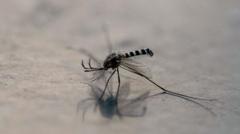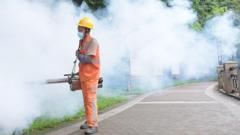Authorities in Manila are attempting to remain proactive against dengue, despite social media skepticism surrounding the effectiveness of this strategy.
Philippine Town Initiates Controversial Mosquito Bounty Amid Dengue Surge

Philippine Town Initiates Controversial Mosquito Bounty Amid Dengue Surge
In a bold move to combat rising dengue cases, a Philippine urban center has begun offering cash rewards for mosquitoes.
In an unusual public health initiative, officials in Barangay Addition Hills, a densely populated area of Manila, have introduced a bounty for mosquitoes as part of their efforts to address a concerning spike in dengue fever cases. Village chief Carlito Cernal announced the offer of one peso (around two US cents) for every five mosquitoes collected.
While the announcement has sparked criticism and mockery on social media, Cernal emphasizes the necessity of this initiative in light of the fatalities and rising infection rates—specifically, the recent deaths of two local students from dengue. The bounty program is set to last at least one month and includes rewards for both dead and alive mosquitoes, with live specimens destined for extermination using ultraviolet light.
Since the program's launch this past week, Cernal reports that 21 individuals have already claimed their rewards, contributing a total of 700 mosquitoes and larvae. Comments on social media have ranged from humorous to sarcastic, with many voicing concerns about the practicality of such a method in halting dengue's spread. The Philippine Department of Health has responded by acknowledging the intentions behind the initiative but has refrained from endorsing it as an effective approach, suggesting instead that local governments consult health officials for proven strategies.
Cernal argues that or such an initiative is essential in a region struggling with poor living conditions that exacerbate dengue outbreaks, citing 44 recent cases in the Barangay. Addition Hills, home to approximately 70,000 residents within a compact area of 162 hectares, has been grappling with the rise in mosquito-related diseases, prompting renewed efforts to improve sanitation and eliminate breeding sites.
Dengue is endemic to tropical regions, with outbreaks often coinciding with periods of heavy rainfall, which promote the proliferation of mosquitoes. In the Philippines, health authorities reported over 28,000 dengue infections as of early February—a 40% increase compared to the previous year—prompting calls for community action against potential breeding grounds. Beyond dengue, increased rainfall has also led to a rise in other health issues related to poor sanitation, including influenza-like illnesses and leptospirosis.
While the announcement has sparked criticism and mockery on social media, Cernal emphasizes the necessity of this initiative in light of the fatalities and rising infection rates—specifically, the recent deaths of two local students from dengue. The bounty program is set to last at least one month and includes rewards for both dead and alive mosquitoes, with live specimens destined for extermination using ultraviolet light.
Since the program's launch this past week, Cernal reports that 21 individuals have already claimed their rewards, contributing a total of 700 mosquitoes and larvae. Comments on social media have ranged from humorous to sarcastic, with many voicing concerns about the practicality of such a method in halting dengue's spread. The Philippine Department of Health has responded by acknowledging the intentions behind the initiative but has refrained from endorsing it as an effective approach, suggesting instead that local governments consult health officials for proven strategies.
Cernal argues that or such an initiative is essential in a region struggling with poor living conditions that exacerbate dengue outbreaks, citing 44 recent cases in the Barangay. Addition Hills, home to approximately 70,000 residents within a compact area of 162 hectares, has been grappling with the rise in mosquito-related diseases, prompting renewed efforts to improve sanitation and eliminate breeding sites.
Dengue is endemic to tropical regions, with outbreaks often coinciding with periods of heavy rainfall, which promote the proliferation of mosquitoes. In the Philippines, health authorities reported over 28,000 dengue infections as of early February—a 40% increase compared to the previous year—prompting calls for community action against potential breeding grounds. Beyond dengue, increased rainfall has also led to a rise in other health issues related to poor sanitation, including influenza-like illnesses and leptospirosis.




















